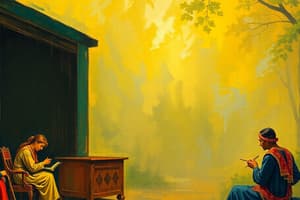Podcast
Questions and Answers
What is the purpose of the Drafting Committee of the Constitution?
What is the purpose of the Drafting Committee of the Constitution?
- To interpret the Constitution
- To create the Constitution of India (correct)
- To amend existing laws
- To enforce laws in India
What are Fundamental Rights intended to ensure?
What are Fundamental Rights intended to ensure?
- Power distribution among states
- No taxation without representation
- Equality and freedom for all citizens (correct)
- Focusing only on economic growth
What does the No-Confidence Motion signify?
What does the No-Confidence Motion signify?
- Support for the government
- Dissatisfaction with a government’s performance (correct)
- Random criticisms by the opposition
- Approval of the President's actions
What is the role of the Speaker in Parliament?
What is the role of the Speaker in Parliament?
What are Directive Principles of State Policy designed for?
What are Directive Principles of State Policy designed for?
Flashcards
Who drafted the Indian Constitution?
Who drafted the Indian Constitution?
The Drafting Committee was tasked with creating the Indian Constitution. It included prominent leaders like Dr. B.R. Ambedkar, Jawaharlal Nehru, Sardar Vallabhbhai Patel, and others.
What are Fundamental Rights?
What are Fundamental Rights?
Fundamental Rights are the basic freedoms and rights guaranteed to every citizen of India. They are protected by the Constitution and can't be violated by the government or any individual. They are classified into six categories: Right to Equality, Right to Freedom, Right against Exploitation, Right to Freedom of Religion, Cultural and Educational Rights, and Right to Constitutional Remedies.
What are Fundamental Duties?
What are Fundamental Duties?
Fundamental Duties are the moral obligations that citizens are expected to perform towards the nation. They are enshrined in Part IV-A of the Constitution. They include duties like respecting the National Flag, promoting harmony, preserving the environment, and striving for excellence.
What are the Prime Minister's powers?
What are the Prime Minister's powers?
Signup and view all the flashcards
What is Judicial Review?
What is Judicial Review?
Signup and view all the flashcards
Study Notes
Indian Constitution - Model Questions
- Answer all the following questions in 25-30 words each. (8.5 x 8 = 15)
Part A
- The Drafting Committee of the Constitution
- The Role of Ambedkar in making Indian Constitution
- Fundamental Rights - Meaning & Types
- Fundamental Duties -11
- No Confidence Motion
- Judicial Review
- Activism
- Directive principles of State
- The Meaning of Impeachment
- Role of Speaker in Parliament
Part B
- Answer any three of the following in 150 words each. (3 x 5 = 15)
- Constitution Assembly - Preamble
- Fundamental Duties
- Power and functions of Prime Minister
- Power and functions of Rajya Sabha
- Power and functions of State High Court
- Directive principles of State
- Position and Duties of Speaker, Vice-President of India
Studying That Suits You
Use AI to generate personalized quizzes and flashcards to suit your learning preferences.




